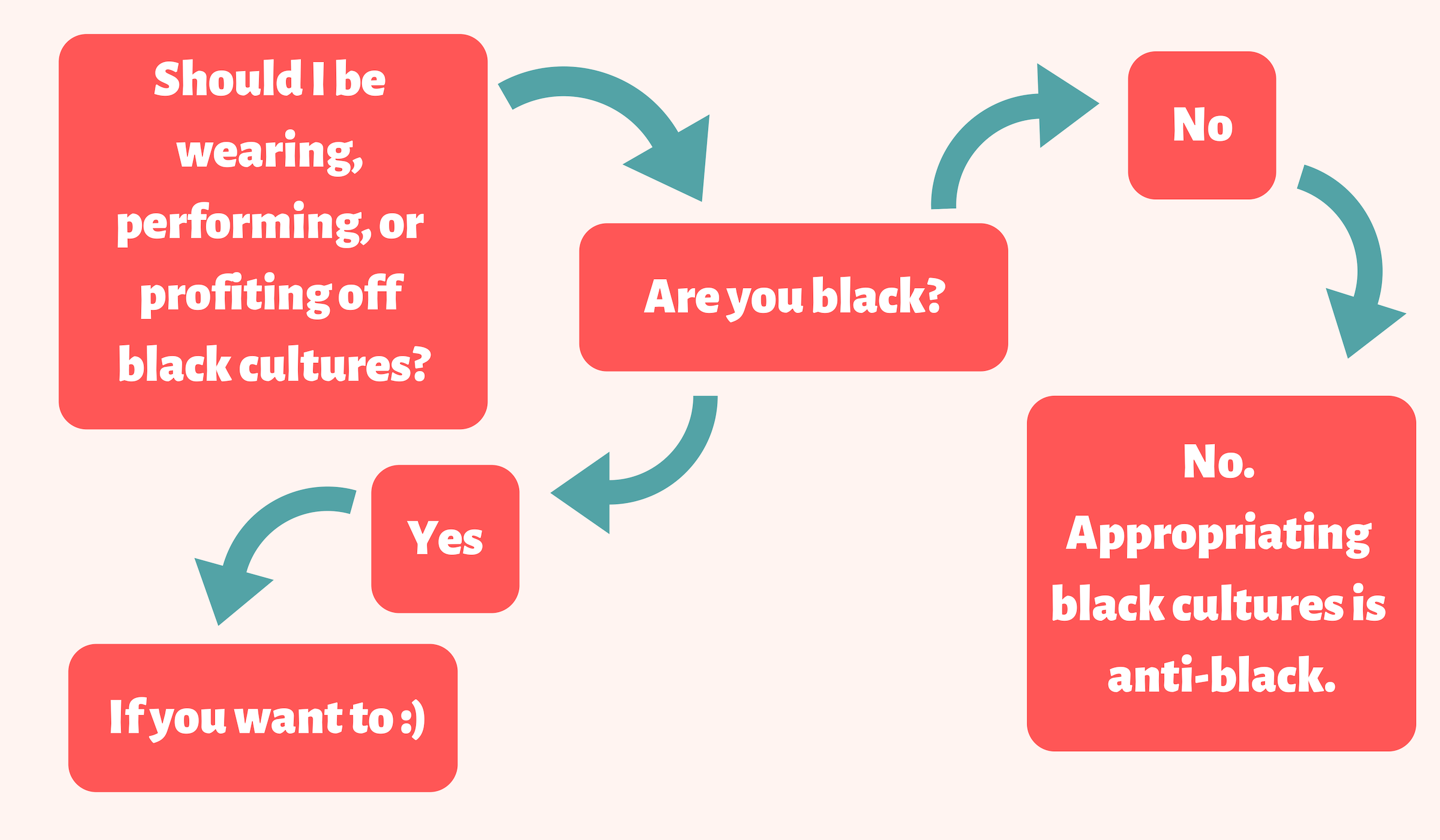resources on cultural appropriation
A short summary and list of resources discussing the issue of Southeast and East Asians appropriating Black cultures.

CW: cultural appropriation, anti-blackness, mentions of slavery and colonialism.
daikon* are committed to facilitating spaces which are inclusive and safe for black people (asian and non-asian alike), but acknowledge that this requires a deeper problematisation of how non-black Southeast and East Asians engage with black cultures. Having previously addressed anti-blackness in SE/E Asian communities on our blog, this list addresses the way in which anti-blackness also manifests as appropriation of black cultures and expression.
The discussion on cultural appropriation will be well-known to most people of colour, but is often reduced to white people’s cooptation of cultures they don’t belong to and aesthetics which they don’t know the significance of. While this is a valid concern, this focus tends to overshadow the ways in which cultural appropriation is not only about taking from a culture you’re not part of, but parallels histories and actualities of colonisation, slavery, land grabs, exploitation, and inequality. In other words, cultural appropriation is significant because it perpetuates systematic relations of extraction, dispossession, and profit. These relations exists among POC too, whether we are extracting actively (i.e. China’s land grabs in Africa) or benefiting passively from a system that value non-black, and particularly, light skinned Asians over black people.
SE/E Asians adopting black cultures cannot be separated from histories and current manifestations of anti-blackness within our communities both in Asia and in the diaspora. These structure the ways in which non-black SE/E Asians can profit off their engagement with black cultures (whether it is economic or social capital) in ways black people cannot, whilst continuously profiting of anti-blackness.
Recognising the need to have this discussion with our community, we have put together a list of resources which specifically address SE/E Asian appropriation of black cultures from a systemic viewpoint. While these focus on the US context, we find that this issue extends beyond this particular context and that they’re still relevant to the UK and beyond. However, this list is far from exhaustive and there is a need to further discuss this topic in relation to specific contexts.
It is important to understand that Black peoples’ interactions with other cultures are not based on a historically violent relationship of taking from and benefiting from those cultures, which is what appropriation consists of.
Hari Ziyad discusses Brooklyn Nets player Jeremy Lin’s appropriation of dreadlocks within the wider context of anti-blackness. Via Afropunk.
For non-Black Asian Americans who actually did grow up in Black neighborhoods, it’s one thing to absorb their culture, it’s another to monetize and exploit Blackness. They are effectively being rewarded for Blackness in a way that Black people are not.
I hope for more inclusion and participation of Asians and Asian-Americans in American media. But, when credit is meant to be given, and Asians are given fame and money for a culture that isn’t theirs, and when we as their fellow POC are left in the dust still fighting for their rights and end of the appropriation of their culture along with ours, it feels like we’ve drawn the short end of the stick.
Wang, like Michelle from Yellow Rage, refuses to deal with what the legacy of being property (always owned, and never owners) means in the case of Black people and claims of ownership over culture.
Both Nia and Muquing cite this blog post by Kenyon Farrow, where he discusses Asian-Americans' appropriation of Hip Hop through his experience of an Asian-American Hip Hop event and an account of anti-blackness in the US. via kenyonfarrow.com.
To open up the conversation keeping in mind the British and/or European context, we suggest some points for reflection:
- How do racial hierarchies that exist in the UK and various countries in Europe affect the meaning of appropriation of black cultures by Southeast or East Asian diasporas?
- What histories and realities of colonisation and exploitation might affect the meaning of appropriation of black cultures by Southeast or East Asian diasporas in the UK?
- How do we resist the issue of non-black people profiting from black cultures materially, rather than simply abstaining from engaging in cultural appropriation?
If you would like to comment on this or add a resource to the list, please email daikon.media@gmail.com.